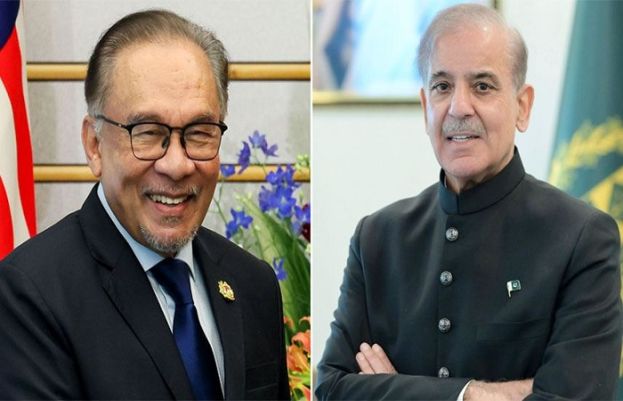Pakistan and Malaysia have reaffirmed their commitment to promoting balanced and sustainable economic ties through enhanced market access, and business facilitation. This commitment was expressed at a meeting between Prime Minister Shehbaz Sharif and his Malaysian counterpart Anwar Ibrahim during Shehbaz Sharif’s visit to his three-day official visit to Malaysia that concluded on Tuesday. According to the Joint Statement issued on Tuesday, the two sides also emphasized effective utilisation of the Malaysia-Pakistan Closer Economic Partnership Agreement. Malaysia expressed its intention to expand palm oil exports to the Pakistan. Both leaders acknowledged the growing global demand for halal products and services, and agreed to strengthen cooperation in the field of halal. The two countries are committed to facilitate mutual recognition of halal certification, strengthen halal food supply and product manufacturing, and share best practices of halal certification. Acknowledging importance of sustainable agricultural practices, they agreed to explore joint research, innovation, and the development of sustainable agricultural production methods. Besides, they agreed to further deepen the bilateral cooperation, particularly in the field of defence science, technology, and industry, through knowledge and technology transfer. They also welcomed further cooperation in education, including technical and vocational training, and the enhancement of institutional partnerships. Recognizing the importance of aviation in fostering greater connectivity and promoting people-to-people exchanges, the leaders agreed to enhance air travel services and explore opportunities for increased connectivity between Malaysia and Pakistan. They agreed to explore collaboration in healthcare, pharmaceuticals, and medical devices, with the aim of enhancing public health and commercial exchanges in these sectors. Both Leaders expressed optimism in expanding tourism cooperation, particularly in light of Malaysia’s “Visit Malaysia 2026” and “Malaysia Year of Medical Tourism 2026” campaigns. Malaysia extended a warm welcome to Pakistani travelers, and the leaders agreed to enhance tourism promotion and cultural exchanges from both sides. The two sides recognized the importance of people-to-people ties and welcomed the positive contribution of the Pakistani diaspora in Malaysia to national development. They reaffirmed their commitment to strengthen cooperation in the area of labour, including technical training and skills development. The two leaders agreed to explore cooperation in the fields of renewable energy, energy transition, and climate resilience, including knowledge-sharing, joint research and investment in clean energy projects. They reaffirmed their support for enhanced collaboration in science, technology, and innovation, including cooperation in areas such as artificial intelligence and digital transformation. Underscoring critical importance of regional cooperation in disaster management and risk reduction, both leaders committed to enhancing the exchange of knowledge and best practices in humanitarian assistance, emergency response, and post-disaster recovery and reconstruction. Furthermore, they expressed their commitment to enhance cooperation in cyber-security and efforts in combating transnational organised crimes, terrorism, terrorism financing as well as cybercrime. They agreed to continue exchanging information and expertise to address emerging security challenges. Reaffirming their commitment towards mutual support at the international fora, they reiterated their shared commitment to strengthening solidarity of the Muslim Ummah and upholding the true values of Islam. They emphasized resolution of international challenges through peaceful means in full accordance with international law and relevant United Nations resolutions. The two Prime Ministers also discussed geopolitical issues, particularly the ongoing conflicts in the Middle East and the humanitarian situation in Rakhine State, Myanmar, which affects the Rohingya Muslim community. They strongly condemned the ongoing genocide in Gaza and reiterated their unwavering support for the Palestinian people’s right to self-determination and the establishment of a sovereign, viable, contiguous, and independent Palestinian state, based on pre-June 1967 borders with Al-Quds Al-Sharif as its capital. They also called for an immediate, unconditional and permanent ceasefire, an end to the blockade on Gaza, the protection of all civilians and for unimpeded flow of humanitarian assistance to those affected immediately. Both leaders emphasized the importance of a just and lasting solution to the challenges in bringing peace and stability to the region. Both leaders also commended the international community’s efforts to find pragmatic measures in resolving the question of granting a Palestinian statehood. The two leaders agreed that disputes must be resolved through peaceful means in accordance with international law including the UN Charter, and relevant UN Security Council resolutions. Talking about the regional situation, they reaffirmed their commitment to a peaceful and stable Afghanistan and a sustainable future for its people. They emphasized the importance of continued engagement with the interim Afghan authorities, particularly for combating terrorism, to prevent the use of Afghan soil against other countries. Highlighting the need for inclusive governance and protection of fundamental rights in Afghanistan, the leaders stressed the importance of maintaining humanitarian assistance and capacity building for the Afghan population. The leaders condemned all forms of Islamophobia, xenophobia and incitement to violence. They reaffirmed their call upon the international community to undertake concerted action to combat intolerance, negative stereotyping, stigmatization, discrimination, and violence against persons based on religion or belief. Prime Minister Shehbaz Sharif reaffirmed Pakistan’s strong support for Malaysia’s ASEAN Chairmanship and expressed confidence in Malaysia’s leadership in steering ASEAN towards deeper regional integration, peace, and prosperity. Both Leaders welcomed the progress made in implementing the ASEAN-Pakistan Sectoral Dialogue Partnership: Practical Cooperation Areas 2024- 2028. Shehbaz Sharif also expressed deep appreciation and sincere gratitude to Prime Minister Anwar Ibrahim and the Government of Malaysia for the warm welcome and gracious hospitality extended to him and his delegation during the visit.
Pakistan, Malaysia agree to promote economic ties

